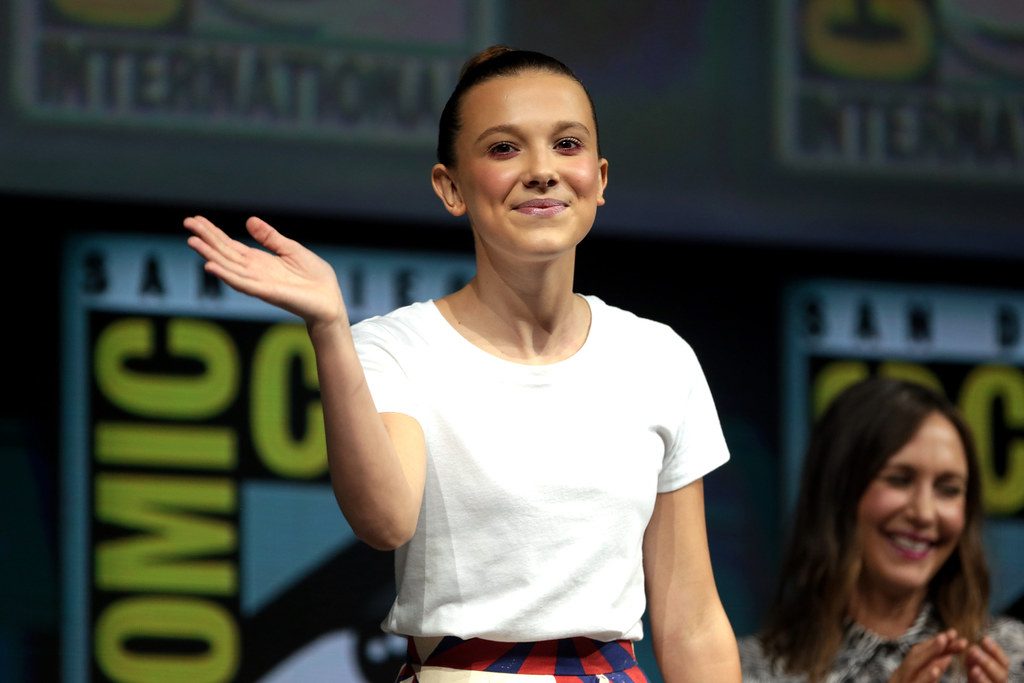
By Catherine Taylor
15 year-old ‘Stranger Things’ star, Millie Bobby Brown has just launched her own makeup and skincare line, Florence By Mills. Named for her grandmother Florence, the actress’s new venture is an affordable line of cosmetics aimed at her Gen-Z audience, cleverly marketed as vegan and cruelty-free. Born in 2004, it could easily boggle the mind that such a young person has already acquired a dedicated following willing to spend money on her products, but this is the Instagram age. We live in a world where influencers rule the internet and celebrity makeup brands dominate the beauty industry. From Kylie Skin to Miranda Kerr’s Kora Organics to Rihanna’s Fenty Beauty, celebrities are often the most trusted beauty influencers for young people, both in Ireland and abroad.
When asked why she felt the need to create a cosmetics line suitable for tween consumers, Brown stated: ‘I wanted to come into the space because there was a gap in the market for young people. There are multiple different products I’ve put on that weren’t good for me. Some of those were anti-aging, and I was 10 years old.’ Coming fresh off the news that 88% of Irish Gen-Z girls consider makeup and beauty to be a top priority in their lives, it’s no surprise that influencers like Brown (who has nearly 30 million Instagram followers and a net worth of $4 million, prior to Florence’s launch) are making a grab for such a prolific and profitable industry.
However, it’s easy to see why beauty experts are sceptical of these celebrity-endorsed beauty brands. Whilst many customers remain loyal to more ‘traditional’ makeup brands such as MAC and Nars, cosmetic companies like Huda Kattan’s bestselling Huda Beauty are making their own way in the beauty world, thanks to the viral appeal of social media. So where does this leave the traditionalists? Some would argue that celebrity makeup brands scrimp on quality and overinflate on price, which in many cases is a valid point. Recently, Kylie Jenner, who is the world’s youngest billionaire at 21, faced major criticism for launching her new line of skincare products, Kylie Skin. The line features a facial scrub infused with real walnut extract, which dermatologists condemned almost immediately for the ‘micro-tears’ and potential, irreversible damage the product could do to the skin.
In an industry (and culture) where looks are of paramount importance, it can be easy to succumb to the pressure to look a certain way. However, what constitutes beauty has become more diverse in recent years, helped along by brands such as Rihanna’s Fenty Beauty, which is characterised by its commitment to inclusivity. Launched in 2017, Fenty Beauty seems to be one of a few celebrity-made makeup brands that is (somewhat) worth the hype. The Pro Filt’r Soft Matte Longwear foundation, €34 at Boots, is a much raved-about full-coverage foundation hailed for the diverse number of shades it carries. It should be noted, therefore, that sometimes the promise of diversity is the best marketing strategy for an up-and-coming beauty line. In an oversaturated makeup and skincare market, even a 15 year old actress can find a niche. Therefore, it’s important that we, as consumers, are careful with how (and where) we spend our hard-earned money.